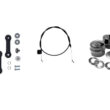Carvana recently settled a lawsuit for $850,000 in damages, including $600,000 in civil penalties and $150,000 for each affected county. Despite not admitting any wrongdoing, the settlement highlights the importance of transparency in the automobile industry. As a car blogger, I’m always on the lookout for industry news and updates, and this serves as a reminder for companies to be honest with their customers.
Background on Carvana lawsuit
Carvana, the online used car retailer, has been in the spotlight recently due to an ongoing lawsuit filed against them by the California New Car Dealers Association (CNCDA). The suit alleged that Carvana, along with other online car dealers, were operating unlawfully by avoiding certain costs and fees associated with traditional brick-and-mortar dealerships.
The lawsuit claimed that Carvana was violating state and federal laws by operating a vehicle sales platform that was not licensed as a dealership. This allowed them to avoid taxes and fees that traditional dealerships pay, giving them a competitive advantage in the market. As the lawsuit progressed, allegations of deceptive advertising and other violations emerged.
Details of the lawsuit settlement
In August of 2021, Carvana announced that it had settled the lawsuit with the CNCDA. The company did not admit any wrongdoing in the settlement but agreed to pay $850,000 in damages. Of that amount, $600,000 will be paid as civil penalties, with each county receiving $150,000.
Additionally, Carvana will be required to make changes to their business practices, including obtaining appropriate dealer licenses for their operations in California. They will also be required to provide consumers with more information about the cars they are purchasing through their online platform.
Carvana’s statement on the settlement
In a press release announcing the settlement, Carvana emphasized that they had not admitted any wrongdoing and that the settlement did not include any finding of fault or liability against the company. They maintained that their business practices were legal and that they had cooperated fully with the CNCDA throughout the litigation.
Carvana also pledged to improve transparency in their business practices and to continue to provide a streamlined and convenient car-buying experience for their customers.
The impact of the settlement on Carvana’s reputation
The settlement with the CNCDA is unlikely to have a significant impact on Carvana’s reputation in the long term. The company remains a popular choice for consumers looking to purchase used cars online, and the settlement did not include any finding of fault against them.
However, the lawsuit did bring attention to the legal gray area that online car retailers operate in, and there may be increased scrutiny of their business practices in the future.
Discussion on the legality of Carvana’s business practices
The legality of Carvana’s business practices has long been a topic of debate in the automotive industry. While many see the company’s online platform as innovative and convenient, others argue that they are operating in a legal gray area by avoiding taxes and fees associated with traditional dealerships.
The California lawsuit is just one example of the challenges faced by online car retailers when it comes to regulation and compliance. As more and more consumers turn to online platforms for their car-buying needs, it is likely that these issues will only become more pressing.
Insights from experts on the lawsuit and its implications for the used car industry
Industry experts have offered varying opinions on the lawsuit and its implications for the used car industry. Some see it as a necessary step to ensure that all players in the market are operating on a level playing field, while others believe that it could stifle innovation and competition in the industry.
Regardless of how one views the lawsuit, it is clear that the used car market is undergoing significant changes as a result of technology and shifting consumer preferences. Companies like Carvana are at the forefront of these changes, and it remains to be seen how regulatory bodies will adapt to these new models of doing business.



